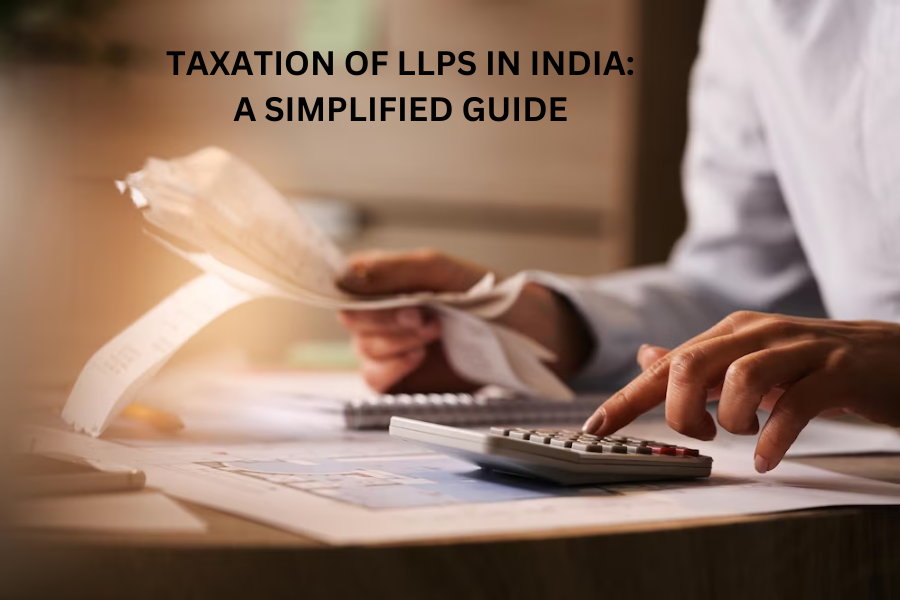Limited Liability Partnerships (LLPs) are becoming increasingly popular in India. They offer several advantages over traditional partnerships, such as limited liability protection for its partners. However, with this increased popularity comes a need for a simplified guide to taxation of LLPs in India. In this article, we will provide a comprehensive overview of the taxation of LLPs in India, including the Limited Liability Partnership registration process, compliance requirements, and tax liabilities.
Registration Process
The registration process for an LLP in India requires several steps and compliance with various legal formalities.
Obtain DSC and DIN
Obtaining a Digital Signature Certificate (DSC) and Director Identification Number (DIN) for all partners is the first step towards LLP registration. You need a DSC to sign electronic documents. Whereas, the DIN is a unique identification number that every director of a company or partner of an LLP must have.
Select Unique Name
Next, the LLP must select a unique name that complies with the Ministry of Corporate Affairs (MCA) guidelines. The name must not be identical or similar to any existing company or LLP name, and it should not violate any trademark laws. After selecting a name, the LLP must file an application with the Registrar of Companies (ROC) to obtain approval.
File Incorporation documents
After obtaining the name approval, the LLP must file the incorporation documents with the ROC. The documents required for incorporation include the LLP Agreement and Form-2. The LLP Agreement is a crucial document that outlines the rights and responsibilities of each partner. It also has important information such as profit-sharing ratio, and other important details. LLPs must execute the agreement on a non-judicial stamp paper and file it with the ROC within 30 days of incorporation.
Pay Registration Fees
Finally, the LLP must pay a registration fee based on the amount of capital contributed by the partners. The registration fee is calculated based on the nominal value of the contribution made by each partner. The minimum registration fee for an LLP is Rs. 500, while the maximum fee is Rs. 10,000.
In addition to the above steps, the LLP must also comply with various statutory requirements under the Limited Liability Partnership Act, 2008. These requirements include maintaining proper books of accounts, filing annual returns with the ROC etc. It also includes getting the accounts audited if the turnover exceeds a certain threshold. By complying with these legal formalities, an LLP can ensure smooth operations and avoid any legal or tax-related issues in the future.
Compliance Requirements
Every registered LLP has to comply with various statutory requirements under the Limited Liability Partnership Act, 2008. For example, the LLP must file an annual return with the ROC within 60 days of the end of the financial year, which includes details of the partners, changes in the partnership agreement, and any other relevant information. Additionally, LLPs must maintain proper books of accounts. If the LLPs annual turnover exceeds Rs. 40 lakhs or the contribution exceeds Rs. 25 lakh, they need to get audited annually. Finally, the LLP must also file income tax returns every year and pay the requisite taxes on time.
Tax Liabilities
LLPs are taxed differently than traditional partnerships in India. The income of an LLP is taxed at a flat rate of 30% plus a surcharge and education cess. However, if the LLP’s turnover does not exceed Rs. 1 crore, it can opt for a lower tax rate of 25%. The LLP is also have to pay advance tax if its tax liability for the financial year is more than Rs. 10,000.
In addition to income tax, LLPs are also subject to other taxes, such as Goods and Services Tax (GST) and Professional Tax. If the LLP’s turnover exceeds Rs. 40 lakhs, it must register for GST and pay GST on its sales. Professional tax is a state-level tax that is levied on individuals and entities engaged in a profession or trade. LLPs are also subject to this tax (the amount varies depending on the state in which the LLP is registered).
Deductions and Exemptions
LLPs are eligible for several deductions and exemptions under the Income Tax Act, 1961. For example, the LLP can claim deductions for expenses incurred for business purposes, such as rent, salaries, and office supplies. The LLP can also claim deductions for depreciation on assets used for business purposes, such as machinery and equipment.
LLPs can also claim exemptions under certain circumstances. For example, if the LLP receives income from investments in specified infrastructure bonds, it can claim an exemption under Section 10(15)(iv)(h) of the Income Tax Act. Additionally, LLPs engaged in the business of developing and building affordable housing can claim an exemption under Section 80-IBA of the Income Tax Act.
Conclusion
In conclusion, LLPs are a popular business structure in India due to their limited liability protection and other advantages. However, LLPs must comply with various statutory requirements and tax liabilities. Therefore, it is essential to understand the registration process, compliance requirements, and tax implication of an LLP in India. By following the guidelines provided in this article, LLPs can ensure that they comply with the necessary statutory requirements and pay the requisite taxes on time. Additionally, by taking advantage of deductions and exemptions provided under the Income Tax Act, LLPs can minimize their tax liabilities and maximize their profits.
Overall, while the taxation of LLPs in India may seem complex, following the guidelines provided in this article can help simplify the process. By staying compliant with the statutory requirements and understanding their tax liabilities, LLPs can operate their business smoothly and focus on their core operations.









